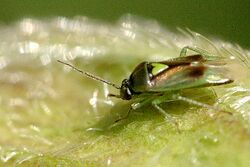Biology:Orthops campestris
From HandWiki
Short description: Species of true bug
| Orthops campestris | |
|---|---|

| |
| Scientific classification | |
| Domain: | Eukaryota |
| Kingdom: | Animalia |
| Phylum: | Arthropoda |
| Class: | Insecta |
| Order: | Hemiptera |
| Suborder: | Heteroptera |
| Family: | Miridae |
| Genus: | Orthops |
| Species: | O. campestris
|
| Binomial name | |
| Orthops campestris | |
| Synonyms | |
| |
Orthops campestris is a species of plant bugs belonging to the family Miridae, subfamily Mirinae,[1] that can be found everywhere in Europe except for Azores, Faroe Islands, Iceland and African islands such as Canary Islands and Cyprus.[2] and across the Palearctic to Central Asia and Siberia.
Description and ecology
It is 4 millimetres (0.16 in) long with short antennae. They feed on wild parsnip, Angelica, Heracleum , Aegopodium, Daucus, Anthriscus, Pimpinella, Anethum, and in gardens on Levisticum officinale. Adults overwinter after which they mate in spring. The new generation starts in July.[3] [4]
References
- ↑ Kerzhner I. M.; Josifov M. (1999). "Family Miridae". in Aukema, Berend. Catalogue of the Heteroptera of the Palaearctic Region. 3, Cimicomorpha II. Amsterdam: Netherlands Entomological Society. pp. 1–577, pages 132 & 133. ISBN 978-90-71912-19-1.
- ↑ "Orthops (Orthops) campestris (Linnaeus, 1758)". Fauna Europaea. August 29, 2013. http://www.faunaeur.org/full_results.php?id=452078. Retrieved October 14, 2013.
- ↑ "Orthops campestris". British Bugs. http://www.britishbugs.org.uk/heteroptera/Miridae/orthops_campestris.html. Retrieved June 23, 2013.
- ↑ Ekkehard Wachmann, Albert Melber, Jürgen Deckert: Wanzen. Band 2: Cimicomorpha: Microphysidae (Flechtenwanzen), Miridae (Weichwanzen) (= Die Tierwelt Deutschlands und der angrenzenden Meeresteile nach ihren Merkmalen und nach ihrer Lebensweise. 75. Teil). Goecke & Evers, Keltern 2006, ISBN:3-931374-57-2.
Wikidata ☰ Q10612459 entry
 |

